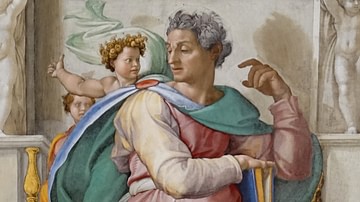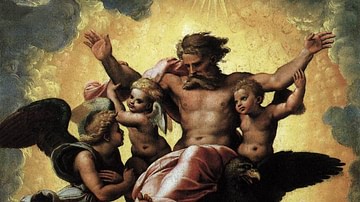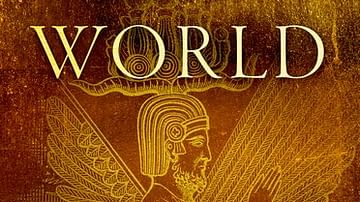Search
Search Results

Definition
Isaiah
Isaiah was one of the major prophets of ancient Israel. Isaiah is Hebrew for "God is salvation." Isaiah is one of the longest prophetic books (66 chapters). Originating in the 8th century BCE, it was updated at least twice, in the 7th and...

Definition
Ezekiel
Ezekiel was both a priest and a prophet who lived in the 6th century BCE. The prophets of Israel were oracles (a term for a person as well as a place) for ways in which humans communicated with their gods. The oracle was possessed by the...

Article
Poor Man of Nippur
The Poor Man of Nippur (c. 701 BCE) is a Babylonian poem on the themes of the obligations of hospitality and revenge for an undeserved injury. A poor man of the city of Nippur feels mistreated when he visits the mayor and then goes to great...

Definition
Mesopotamian Warfare
Ancient Mesopotamian warfare progressed from companies of a city's militia in Sumer to the professional standing armies of Akkad, Babylon, Assyria, and Persia and from conflicts over land or water rights to wars of conquest and political...

Article
Herodotus on Babylon
The description of Babylon and Babylonian customs in Histories by the Greek historian Herodotus (l. c. 484-425/413 BCE) has long been challenged for accuracy and been found wanting, leading some scholars to dismiss the work entirely as more...

Interview
Interview: King of the World by Matt Waters
In this interview, World History Encyclopedia sits down with author Matt Waters to chat about his new book King of the World: The Life of Cyrus the Great published by Oxford University Press. Kelly: Can you tell us a bit about your book...

Definition
Mesopotamian Government - Helping and Serving the Gods
Ancient Mesopotamian government was based on the understanding that human beings were created to help and serve the gods. The high priest, king, assembly of elders, governors, and any other officials were recognized as stewards chosen by...

Definition
Mesopotamian Religion - Daily Life as a Form of Worship
Mesopotamian religion was central to the people's lives. Humans were created as co-laborers with their gods to hold off the forces of chaos and to keep the world running smoothly. As in ancient Egypt, the gods were honored daily for providing...

Definition
Hammurabi
Hammurabi (r. 1792-1750 BCE) was the sixth king of the Amorite First Dynasty of Babylon best known for his famous law code which served as the model for others, including the Mosaic Law of the Bible. He was the first ruler able to successfully...

Definition
Medes
The Medes or Medians were a group of Indo-Iranian-speaking people from central Asia who migrated westwards and entered northern Iran around the end of the 2nd millennium BCE. They settled in the highlands of Zagros (Zagreus in Greek) and...